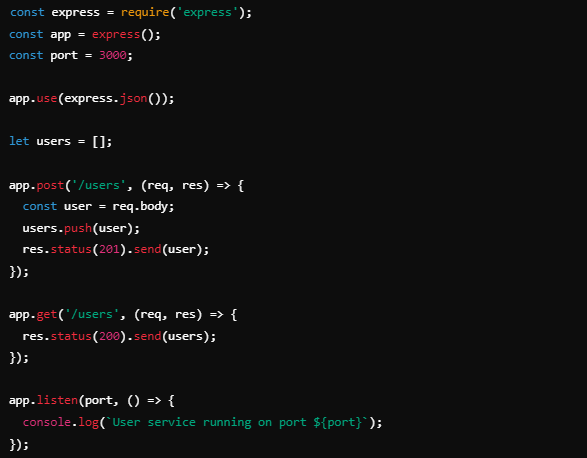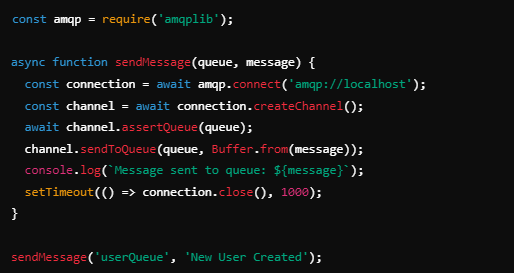Microservices Architecture with Node.js A Complete Guide | iCert Global

Microservices architecture is a popular design in software development. Its flexibility, scalability, and modularity drive its popularity. Unlike traditional monolithic architectures, microservices are different. They split applications into smaller, independent services that communicate via APIs. Every service is tailored to address a distinct business function. This allows teams to develop, deploy, and scale them independently.
Node.js is ideal for microservices. Its async, non-blocking I/O and event-driven nature make it a perfect fit. It has high performance and scalability. So, it's ideal for building distributed systems. This guide will explore how Node.js fits into microservices. We will discuss key concepts. Then, we will walk through steps to build and manage microservices with Node.js.
1. Understanding Microservices Architecture
Microservices architecture breaks a large app into smaller services. Each service:
- Has its own database: Unlike monolithic systems, which often share a single database, each microservice has a dedicated one. This maintains loose coupling.
- Microservices communicate over APIs. They use lightweight protocols like HTTP/REST or messaging queues like Kafka.
- Is independently deployable. Teams can update services without affecting the whole system.
Benefits of Microservices:
- Scalability: Only the most-used microservices can be scaled up.
- Faster development: Teams can work on different services concurrently.
- Fault isolation: Failure in one service doesn’t bring down the entire application.
- Technology diversity: Teams can use different technologies for different services.
Node.js in Microservices:
- Non-blocking I/O: Node.js can efficiently handle thousands of concurrent requests. This is crucial for microservices that require multiple interactions between services.
- Lightweight and fast: Node.js is great for building fast, minimal services. Its lightweight nature makes it so.
- Rich ecosystem: Node.js has a vast package ecosystem (NPM). It provides tools, libraries, and frameworks to easily build and manage microservices.
2. Building a Microservice with Node.js
To build a Node.js microservice, create lightweight REST APIs for each service. Here’s an overview of the essential steps:
Step 1: Setting Up the Environment
To start building a microservice, install Node.js and initialize a project:
In this example, we’ll use Express.js to handle HTTP requests. Express is a minimal, flexible Node.js framework. It's ideal for microservices.
Step 2: Creating the Service
We will develop a basic microservice for managing user data. Here’s an example of a basic microservice:
Here, we have a simple service that allows you to add and retrieve users. Each microservice would follow a similar pattern but focus on different business logic.
3. Communication Between Microservices
In a microservices setup, different services must communicate effectively. Node.js offers several ways to handle this:
REST APIs:
Most commonly, services communicate via REST APIs using HTTP requests. However, as systems grow in complexity, this can lead to performance bottlenecks.
Message Queues:
An alternative approach is using messaging systems like RabbitMQ or Kafka. Instead of synchronous communication (waiting for responses), services send messages to a queue. Another service listens to this queue and processes the message asynchronously.
Example:
This improves system resilience and decouples services further.
4. Managing Data Consistency Across Microservices
One of the challenges in microservices is maintaining data consistency. Each service has its own database. So, data must be synced or shared.
Event-Driven Architecture:
An event-driven approach can help manage data consistency. When one service updates its data, it emits an event. Other services subscribe to these events and update their own data as needed.
For instance, in an e-commerce system:
- When the Order Service confirms an order, it emits an event (e.g., "OrderPlaced").
- The Inventory Service listens for the "OrderPlaced" event and reduces the inventory count.
Tools like Kafka or Redis Streams can help. They can implement this pattern in a Node.js microservices setup.
5. Microservice Security Considerations
Authentication and Authorization:
With multiple services communicating, security becomes paramount. Common approaches include:
- OAuth2.0: Secure token-based authentication. Users log in once and use the same token to access multiple services.
- JWT (JSON Web Tokens): A compact, self-contained token. It verifies identity between microservices.
API Gateways:
An API Gateway sits between clients and microservices. It manages traffic, handles authentication, and limits exposure to internal services. Popular Node.js API gateways include Express Gateway and Kong.
API Gateways also offer other benefits:
- Rate limiting and load balancing.
- Centralized logging and monitoring.
- Managing communication between services using different protocols.
How to obtain JAVA certification?
We are an Education Technology company providing certification training courses to accelerate careers of working professionals worldwide. We impart training through instructor-led classroom workshops, instructor-led live virtual training sessions, and self-paced e-learning courses.
We have successfully conducted training sessions in 108 countries across the globe and enabled thousands of working professionals to enhance the scope of their careers.
Our enterprise training portfolio includes in-demand and globally recognized certification training courses in Project Management, Quality Management, Business Analysis, IT Service Management, Agile and Scrum, Cyber Security, Data Science, and Emerging Technologies. Download our Enterprise Training Catalog from https://www.icertglobal.com/corporate-training-for-enterprises.php and https://www.icertglobal.com/index.php
Popular Courses include:
- Project Management: PMP, CAPM ,PMI RMP
- Quality Management: Six Sigma Black Belt ,Lean Six Sigma Green Belt, Lean Management, Minitab,CMMI
- Business Analysis: CBAP, CCBA, ECBA
- Agile Training: PMI-ACP , CSM , CSPO
- Scrum Training: CSM
- DevOps
- Program Management: PgMP
- Cloud Technology: Exin Cloud Computing
- Citrix Client Adminisration: Citrix Cloud Administration
The 10 top-paying certifications to target in 2024 are:
- Certified Information Systems Security Professional® (CISSP)
- AWS Certified Solutions Architect
- Google Certified Professional Cloud Architect
- Big Data Certification
- Data Science Certification
- Certified In Risk And Information Systems Control (CRISC)
- Certified Information Security Manager(CISM)
- Project Management Professional (PMP)® Certification
- Certified Ethical Hacker (CEH)
- Certified Scrum Master (CSM)
Conclusion
Microservices architecture has changed how we design modern apps. It is more flexible, scalable, and resilient. Node.js is a great choice for microservices. It has performance benefits and a rich ecosystem. By breaking apps into smaller services, businesses can scale better. They can also respond to changes faster.
This guide is a great start for building microservices with Node.js. It covers creating services, managing communication, ensuring security, and maintaining data consistency. As you dive deeper, explore advanced patterns. Use service discovery, circuit breakers, and distributed tracing. They will make your Node.js microservices robust and production-ready.
Contact Us :
Contact Us For More Information:
Visit :www.icertglobal.com Email : info@icertglobal.com













Write a Comment
Your email address will not be published. Required fields are marked (*)